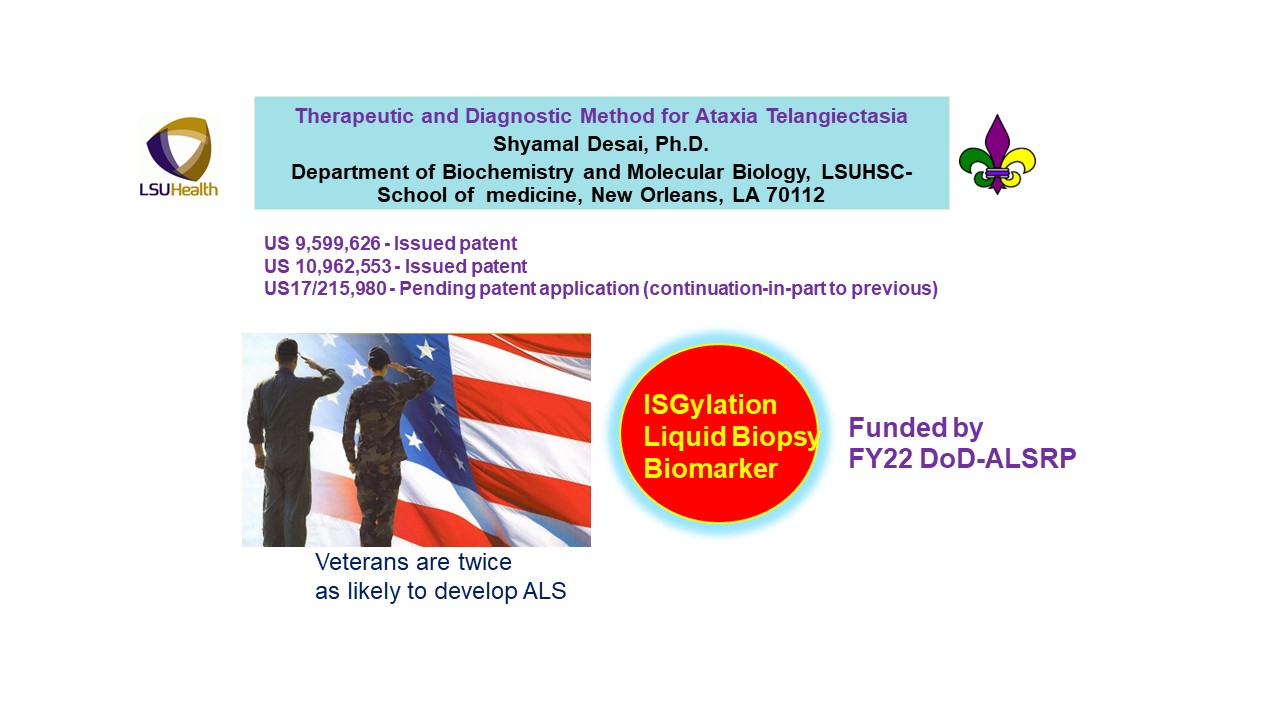Shyamal D. Desai , PhD
|
|||||||
|
|
|||||||
|
This past research focused on identifying the cellular factors responsible for determining the sensitivity of cancer cells to camptothecin, an anticancer drug used in clinic to manage cancers. Of particular interest, we found ISG15, an antagonist of the ubiquitin pathway, is an important determinant of camptothecin sensitivity in tumor cells. Based on these findings, we proposed that ISG15 and factors in its conjugation pathway could serve as tumor biomarkers for CPT sensitivity/resistance in cancer patients, which is now proven in clinical specimens by other groups in the United States and abroad. This is an important leap forward as our research has now moved into clinic. Our current cancer research will reinforce and extend the importance of ISG15 in cancer prevention and treatment in clinic.
ISG15 in Ataxia Telangiectasia In addition to our ongoing work on ISG15 and cancer, my group at LSU has also established that ISG15 is elevated and inhibits the ubiquitin pathway in human A-T cells. Because ISG15 inhibits the ubiquitin pathway, and lesions in the ubiquitin pathway lead to neurodegeneration, understanding the cellular and molecular principles that underpin ISG15's role in A-T neurodegeneration has become an important research priority in my lab. Briefly, we have demonstrated that ISG15 inhibits the protein and mitochondrial turnover pathways in A-T cells. |
|||||||

ISG15 in Amyotrophic Lateral Sclerosis (ALS) and Traumatic Brian injury (TBI)
More recently, we have demonstrated that ISG15 is elevated in the lumbar spinal cords, blood and urine specimens of civilians and veterans affected by Amyotrophic Lateral Sclerosis (ALS) and Traumatic Brain Injury (TBI), both known to induce degeneration of motor neurons. We have therefore identified ISG15 as a liquid biomarker for predicting the risk of ALS and TBI in veterans and civilians exposed to TBI.
Ongoing Research:
We are currently exploring the role of ISG15 in the etiology of cancer and neurodegeneration (in A-T and ALS) using cell culture, mouse, and human specimens in our laboratory.
Faculty Page. LSUHSC School of Medicine - Biochemistry and Molecular Biology
The roles of ubiquitin and ubiquitin-like proteins (SUMO and ISG15) in cancer and neurodegenerative disorders [Ataxia Telangiectasia (A-T), Amyotrophic Lateral Sclerosis (ALS)], and Traumatic Brain Injury (TBI).



